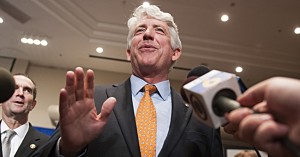Virginia AG says e-signatures OK, despite security concerns

E-SIGNATURES OK: Virginia Attorney General Mark Herring officially gave the legal OK for e-signatures in voter registration.
By Kathryn Watson | Watchdog.org, Virginia Bureau
RICHMOND, Va. — Virginia’s attorney general has given his legal stamp of approval to electronic signatures on voter registration forms submitted by third parties.
After Norfolk’s three-member electoral board wrote Attorney General Mark Herring asking if the law requires, permits, or forbids a local registrar from accepting electronic signatures on voter registration forms, citing concerns about identity theft and verification, Herring responded that the Virginia Department of Elections operated within its authority when it directed local registrars to accept e-signatures.
The department originally directed local registrars to accept e-signatures just before the gubernatorial election in September 2013, according to Edgardo Cortez, spokesman with the Virginia Department of Elections.
“It is my opinion that, although no law requires the acceptance of mailed voter registration applications with electronic signatures, the State Board of Elections is not precluded from directing that general registrars accept such applications, and the State Board, in its discretion, may do so,” the Democratic attorney general wrote in an official advisory opinion dated Sept. 26. “The State Board also has discretionary authority to establish criteria to preserve the security of confidential voter information and to ensure the authenticity and validity of electronic signatures.”
Some states have introduced legislation to either restrict e-signatures for voter registration, or prohibit them while security measures are put in place. Santa Clara County in California became the first locality to accept e-signatures for voter registration in 2010.
Voters can record their signatures using a cursor or stylus on a cell phone or iPad, and then transmit those signatures online to a third party, Herring pointed out in his opinion. Sometimes, the potential voter fills out the information all on his or her own, or the third party can take the person’s information over the phone, with the future voter physically submitting just the signature, Herring said.
Cortez said he wasn’t aware of instances of the latter process in Virginia. The Department of Elections isn’t presently considering any specific security measures, but Cortez said there’s very little difference between the process for electronic forms and physical forms.
“The form is then being printed out and mailed in with the signature on it,” Cortez said. “So I’m not sure what the security concerns would be in this instance.”
Herring pointed out the law doesn’t prohibit any third party from submitting registration forms, as long as they’re filled out properly.
“Although the application must be signed, the statutes do not require signatures to be made in any particular manner,” the attorney general wrote. “No statute either requires or prohibits the use of electronic signatures for mailed voter registration applications.”
The Norfolk Electoral Board couldn’t be reached for comment Thursday.
Voters in Virginia have until Oct. 14 to register, online via mail, or in person, for the Nov. 4 general election. Online registration is relatively new in Virginia.
“We’re looking forward to being able to do more stuff like that, make the process easier for voters,” Cortez said.
— Kathryn Watson is an investigative reporter for Watchdog.org’s Virginia Bureau, and can be reached at kwatson@watchdog.org.







